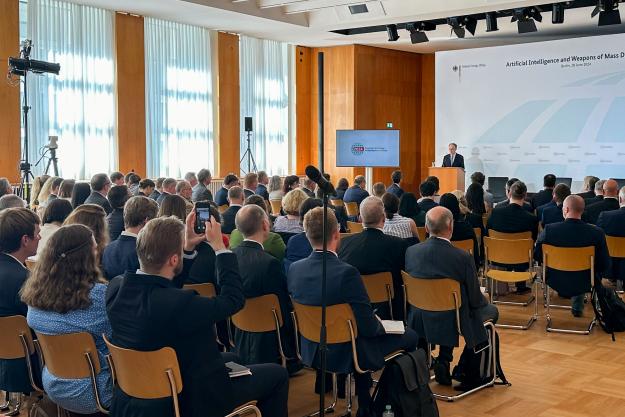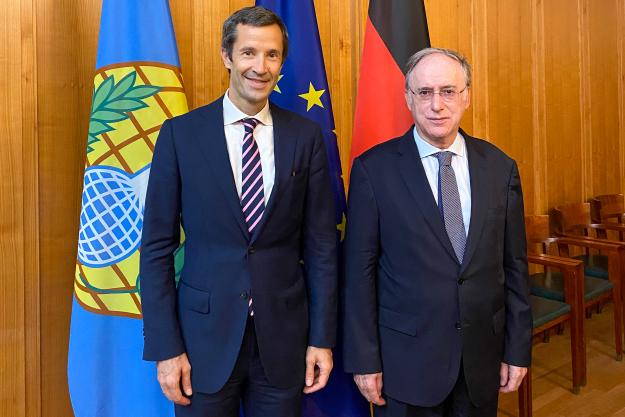
Ambassador Fernando Arias, Director-General of the OPCW, speaks at a conference in Berlin on artificial intelligence and weapons of mass destruction hosted by the German Federal Foreign Office on 28 June 2024.
BERLIN, Germany—4 July 2024—The Director-General of the Organisation for the Prohibition of Chemical Weapons (OPCW), Ambassador Fernando Arias, met with the State Secretary of the German Federal Foreign Office, H.E. Ms Susanne Baumann and other high-level officials, and participated in a conference on Artificial Intelligence (AI) and Weapons of Mass Destruction (WMDs) hosted by the German Federal Foreign Office during an official visit to Berlin on 28 June 2024.
The event, forming part of the German Federal Foreign Office’s conference series entitled “Capturing Technology. Rethinking Arms Control”, brought together international experts and policymakers in the fields of disarmament and science to discuss the risks, challenges, and opportunities for the application of AI related to WMDs.
In his keynote address, the Director-General highlighted the relevance of the conference to contemporary issues facing the OPCW. He emphasised that “the situation today is quite different from when States Parties designed the Chemical Weapons Convention more than 30 years ago. The implementation of the Convention must be adapted to address the spectacular scientific and technological developments, including Artificial Intelligence.”
He commended the Government of Germany and the Federal Foreign Office for supporting the mission of the OPCW and promoting “responsible management of emerging technologies related to arms control by convening this relevant and timely event.” The Director-General further underscored: “We are at the beginning of realising the potential of Artificial Intelligence. We must continue discussing, evaluating, and exploring the impact of AI to harness its benefits and mitigate its risks to the Convention.”
“We must keep our eyes open and cooperate in an efficient way,” he added.
In his opening address to the conference, H.E. Ambassador Günter Sautter, Director General for International Order, the United Nations and Arms Control of Germany’s Federal Foreign Office and Federal Government Commissioner for Disarmament and Arms Control, thanked Director-General Arias for participating in the conference and stated: “Our joint objective is to ensure that technological developments do not endanger the global ban of chemical weapons.”
During his visit, Director-General Arias met with State Secretary of the German Federal Foreign Office, H.E. Ms Susanne Baumann, to discuss the status of the implementation of the CWC. The discussion included geopolitical tensions related to the ongoing conflicts, as well as emerging challenges from developments in science and technology including AI.
The Director-General informed Ms Baumann of the Global Conference on the Role of Artificial Intelligence (AI) in Advancing the Implementation of the Chemical Weapons Convention (CWC), which will be co-organised by the Government of Morocco and the Technical Secretariat of the OPCW in October 2024 in Rabat, Morocco. The Director General thanked the Germany for its pledge of €65,000 to support the event.
The Director-General also held a bilateral meeting with Ambassador Sautter. The two senior officials exchanged in greater detail on the potential benefits and threats AI could pose in the field of chemical non-proliferation and the role of the OPCW in addressing these challenges.

Mr Günter Sautter, Federal Government Commissioner for Disarmament and Arms Control, and Ambassador Fernando Arias, Director-General of the OPCW
Background
The conference series “Capturing Technology. Rethinking Arms Control” was launched in 2019 by the German Federal Government to improve understanding and address potential dangers, challenges, and opportunities that new technologies pose for future arms control.
The Federal Republic of Germany has been an active member of the OPCW since the Chemical Weapons Convention entered into force in 1997. Germany is a member of the Executive Council, the OPCW’s executive organ, which is tasked with promoting the effective implementation of and compliance with the Chemical Weapons Convention as well as supervising the activities of the Organisation’s Technical Secretariat.
To date, Germany has supported diverse OPCW projects and activities, including missions in the Syrian Arab Republic and the OPCW Centre for Chemistry and Technology, with voluntary contributions amounting to over €13 million.
Over the years, the OPCW has been alert to the risks and opportunities related to emerging technologies including artificial intelligence. Since 1998, the Organisation’s Scientific Advisory Board (SAB) has been monitoring developments in science, including emerging technologies, that could affect the Convention’s operation. To further strengthen these efforts, the OPCW built its new Centre for Chemistry and Technology, which was inaugurated in May 2023.
As the implementing body for the Chemical Weapons Convention, the OPCW, with its 193 Member States, oversees the global endeavour to permanently eliminate chemical weapons. Since the Convention’s entry into force in 1997, it is the most successful disarmament treaty eliminating an entire class of weapons of mass destruction.
In 2023, the OPCW verified that all chemical weapons stockpiles declared by the 193 States Parties to the Chemical Weapons Convention since 1997 — totalling 72,304 metric tonnes of chemical agents — have been irreversibly destroyed under the OPCW’s strict verification regime.
For its extensive efforts in eliminating chemical weapons, the OPCW received the 2013 Nobel Peace Prize.
